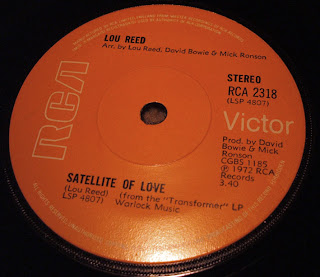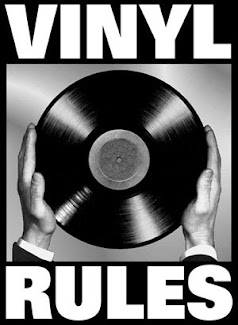 Much has already been written about the work that David Bowie did with Lou Reed and Iggy Pop in the early seventies, so I won’t add much more here.
Much has already been written about the work that David Bowie did with Lou Reed and Iggy Pop in the early seventies, so I won’t add much more here.‘Satellite of Love’ is taken from the album ‘Transformer’ a Bowie and Mick Ronson produced record from 1972. It was issued as the second single in February 1973. Transformer introduced Reed to a wider audience especially in the UK, with the record proving to be Reed’s commercial and critical zenith.
This was to cause resentment in Reed because of the shadow that the record cast over the rest of his career. After the records release Reed and Bowie had a fairly public argument that ended their working relationship for many years.
Mick Ronson, who was at the time the lead guitarist with Bowie's backing band, played a major role in the recording of the album, serving as the co-producer and primary session musician (contributing guitar, piano, recorder and backing vocals) and arranger, notably the lush string arrangement for 'Perfect Day'.
 Reed has praised the beauty of Ronson’s work on the album. David Bowie, can be heard providing background vocals throughout the record, and especially on Satellite of Love.
Reed has praised the beauty of Ronson’s work on the album. David Bowie, can be heard providing background vocals throughout the record, and especially on Satellite of Love.Though this song first saw the light of day on Transformer, it dates back to Reed's previous band The Velvet Underground, and a version of the song recorded by The Velvet Underground surfaced on the ‘Peel Slowly And See’ box set.
Iggy Pop and David Bowie first met in 1971, and there is no doubt that Pop's career received a boost from his relationship with Bowie. The album ‘Raw Power’ was originally produced and mixed by Pop himself, unfortunately, Pop's first attempt wasn’t very good as he mixed most of the instruments into one stereo channel and the vocals into the other.
‘MainMan’ management demanded that the album be remixed, but Pop initially refused. So MainMan informed Pop that if the album were not remixed by Bowie, the album would not be released. Pop eventually agreed.
Due to budgetary constraints, Bowie remixed the songs (except ‘Search and Destroy’ which still retained Pop’s original production) in a single day in an inexpensive Los Angeles studio.
It is said that Columbia executives insisted on two ballads, one for each side of the record. These two "ballads" were 'Gimme Danger' and 'I Need Somebody', both much more ominous and menacing than traditional ballads.
 Guitarists James Williamson and Ron Asheton have both stated that they prefer Bowie's original mix of the album to Pop's re-mastered version that appeared many years later. The version of I Need Somebody here is the Bowie mixed version.
Guitarists James Williamson and Ron Asheton have both stated that they prefer Bowie's original mix of the album to Pop's re-mastered version that appeared many years later. The version of I Need Somebody here is the Bowie mixed version.After the albums release Bowie continued to support Iggy Pop, but drug abuse was again to blame for stalling Pop’s career for some time. Years later Bowie and Pop would relocate to West Berlin where Bowie helped write and produce 'The Idiot' and 'Lust for Life' during 1977. These became Pop's two most acclaimed albums as a solo artist.




























.jpg)























